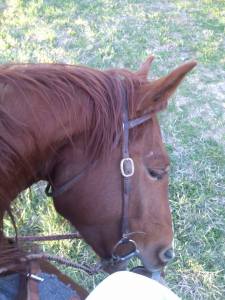At times we get so locked into a certain way of training or thinking that we can’t see, or believe in, another way to teach a horse how to do something. We think because “so-so” says a method doesn’t work or isn’t the way they do something that an outside idea holds no merit. Well, there’s nothing like a horse that doesn’t fit “the mold” to pull a good horseman out of that way of thinking. I’ve always said that difficult horses make the best horsemen and this is one of the reasons why.
The usual give and release methods will work on most difficult horses – if they’re applied correctly. But every now and then you run into a horse that’s a little harder nut to crack and the usual give and release methods will only go so far. That’s when the real work begins.
Sometimes all a tough horse needs is a lesson to be broken down a little more so they can grasp it better. Contrary to popular belief, these types of horses aren’t stupid. In fact they’re quite the opposite – they’re often incredibly smart. The problem is that they’re so smart they get ahead of you and themselves and they get overwhelmed, or they get over stimulated and don’t know how to handle it.
At other times a difficult horse may need an entirely different approach. Horses like that require a good bit of analytical thinking to figure out where they’re coming from and why. Once you figure those two things out, then the next step is taking that information to determine the best way to help the horse out.
Another thing to keep in mind is the big picture. If a horse makes a big stride in one task, don’t hammer on them for one small infraction or the big lesson is lost. Focus on the main thing that you’re trying to teach that day.
As Ray Hunt said, the horse is always right. A lot of horsemen bristle at that remark but it’s entirely true. For one, we’re supposed to be smarter than the horse and expect the horse to be a horse so horse actions shouldn’t really come as a surprise no matter how bad they are. Horses will be horses because that’s what they are and what they do! Not only that, a horse is just a product of what someone made them to be. If they act out it’s because something was missed somewhere –remember, we’re supposed to be the smarter species?
It pays to have an open mind when working with any horse. Just like us, they don’t all fit into a mold and they have good days and bad days. The key is to remember that and be flexible in your approach so that you can figure out the best way to help your horse, not make your horse do something. If nothing else, remember the horse is always right.
So when was the last time your horse did something wrong and what was it? Why do you think he did it? What did you do to help him out?

